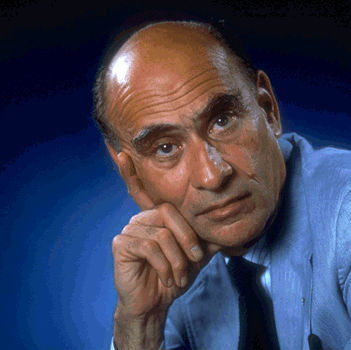Early Years
One of seven children born to an Irish steelworker and a Serbian mother, Linehan was a dedicated movie buff interested in journalism and celebrity from a young age. He was co-editor of his high school newspaper in Hamilton and at age 19 left for Toronto, where he got a job writing advertising copy for Odeon Theatres. He was soon promoted to talent wrangler and tended to stars such as Gregory Peck, Alfred Hitchcock and Joan Crawford. At 24, he became general manager of foreign film distributor Janus Films.
"City Lights Years
Linehan joined Toronto’s Citytv in 1972 as a feature film programmer. When a journalist was forced to cancel an interview with director Eric Till at the last minute Linehan filled in, even though he had never been on camera. The interview was a disaster and Linehan was told afterward that it wouldn’t be aired. He spent the rest of the day on set watching interviews, then rescheduled the interview with Till. By 1973, he was hosting “City Lights,” his 30-minute interviews running live-to-tape, unedited. Linehan soon became renowned for his meticulous research—he spent much of his spare time compiling research files that were often inches thick—comprehensive reporting, and intimate rapport with his subjects. He is quoted as saying that he tried to capture “the whole human being, or the whole career in perspective.”
Linehan conducted more than 2,000 interviews with such celebrities as Margaret Atwood, Barbra Streisand, Paul Newman, Norman Jewison, Jane Fonda, Sophia Loren, and Clint Eastwood. His style — which some criticized as long-winded and self-involved — was so distinctive that Martin Short did a good-natured parody on “SCTV” as “Brock Linehan,” a bumbling incarnation who was so overwhelmed by his own research that he consistently got facts embarrassingly wrong. Linehan also hosted awards shows and network specials, including the Genie Awards (which he hosted five times), and did brief entertainment reports for radio stations CFRB and CHFI.
Reporting, Writing and Teaching
By 1989, the long-form interview format of “City Lights” had become less popular, and Citytv replaced the show with “Movie Television,” a fast-paced, magazine-style entertainment program that Linehan co-hosted with Jeanne Beker. Linehan found this kind of reporting superficial and was soon looking for other work. He wrote entertainment columns as a freelance journalist at the Toronto Sun, but struggled with the brief copy format and lost the job in 1991 due to budget cutbacks. He returned with his interview talk show “Linehan” in 1998—which earned him a Gemini Award for Best Host—and later taught a course called Inside Television at Toronto’s Humber College, where he discovered a love of teaching.
Final Years & Legacy
In March 2002, Linehan was diagnosed with non-Hodgkin’s lymphoma and was soon admitted to hospital. That summer his partner of more than 30 years, Dr. Zane Wagman, committed suicide. Linehan never recovered from this emotional blow and succumbed to his illness two years later.
The Brian Linehan Charitable Foundation was established from the proceeds of Linehan’s estate—valued at $4 million—for the benefit of young filmmakers. His dream was to help create a star system in Canada, providing promotion, training, and work opportunities for young Canadians with exceptional talent. He also donated 30 years’ worth of research material, correspondences, photographs and recordings to the Toronto International Film Festival’s Film Reference Library. Over the years, Linehan’s legacy has grown as his foundation continues to support many programs within various arts organizations, including the National Screen Institute, the Stratford Festival and the Canadian Film Centre.
Linehan’s biography, Starring Brian Linehan: A Life Behind the Scenes, was written by his long-time friend George Anthony and published in 2008.
Awards
1999 Gemini Award for Best Host in a Lifestyle or Performing Arts Program or Series

 Share on Facebook
Share on Facebook Share on X
Share on X Share by Email
Share by Email Share on Google Classroom
Share on Google Classroom

